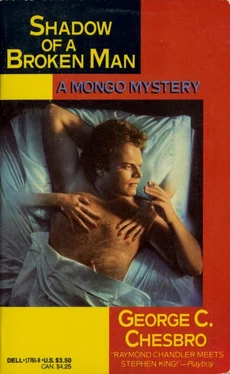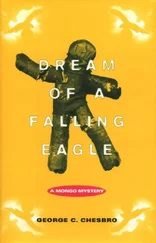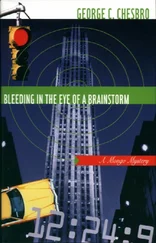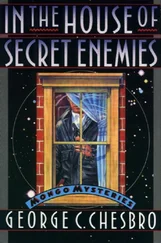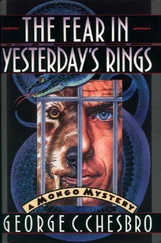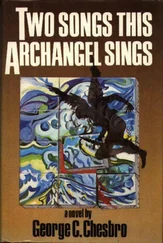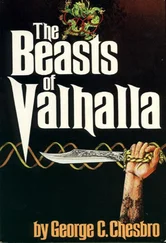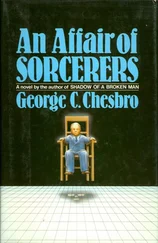George Chesbro - Shadow of a Broken Man
Здесь есть возможность читать онлайн «George Chesbro - Shadow of a Broken Man» весь текст электронной книги совершенно бесплатно (целиком полную версию без сокращений). В некоторых случаях можно слушать аудио, скачать через торрент в формате fb2 и присутствует краткое содержание. Жанр: Триллер, на английском языке. Описание произведения, (предисловие) а так же отзывы посетителей доступны на портале библиотеки ЛибКат.
- Название:Shadow of a Broken Man
- Автор:
- Жанр:
- Год:неизвестен
- ISBN:нет данных
- Рейтинг книги:4 / 5. Голосов: 1
-
Избранное:Добавить в избранное
- Отзывы:
-
Ваша оценка:
- 80
- 1
- 2
- 3
- 4
- 5
Shadow of a Broken Man: краткое содержание, описание и аннотация
Предлагаем к чтению аннотацию, описание, краткое содержание или предисловие (зависит от того, что написал сам автор книги «Shadow of a Broken Man»). Если вы не нашли необходимую информацию о книге — напишите в комментариях, мы постараемся отыскать её.
Shadow of a Broken Man — читать онлайн бесплатно полную книгу (весь текст) целиком
Ниже представлен текст книги, разбитый по страницам. Система сохранения места последней прочитанной страницы, позволяет с удобством читать онлайн бесплатно книгу «Shadow of a Broken Man», без необходимости каждый раз заново искать на чём Вы остановились. Поставьте закладку, и сможете в любой момент перейти на страницу, на которой закончили чтение.
Интервал:
Закладка:
"I'm sorry, but I don't know what a stress engineer does."
" I'm sorry," Thomas said evenly, still smiling, "but I don't know what you do, either."
A quick search of my mental resources still failed to turn up a plausible cover story. "I'm a private detective," I said. "I've been hired to investigate the death-or, uh, disappearance-of Victor Rafferty. I thought you might be able to help me."
Thomas' chuckle was easy, good-natured. "What ever gave you the idea that I could help you? I never even met the man."
"But you asked about him at the dedication ceremony for the Nately Museum."
He thought a moment, then snapped his fingers. "Patern! The architect! That's where you got my name. But I didn't ask about Victor Rafferty; I said the building reminded me of his work." He reached inside his beard, tugged at his lower lip, frowned. "I don't remember telling Patern where I work."
"Mr. Thomas," I said quickly, "will you tell me how you happen to know so much about Rafferty's work?"
A shrug. "Why not? You see, a stress engineer evaluates the structural requirements of a given design, and the geographical location where the proposed building is to be erected. First, I tell the architect whether it's possible to build from his design; if it is, I give him the strength requirements of the materials to be used, depending on the location. For example, any building erected in an earthquake zone is going to have to be stronger than garden apartments in, say, Hoboken. I'm the person who makes those kinds of judgments."
"Then you're not an architect yourself?"
"No. But any stress engineer would be absolutely familiar with Rafferty's work. His 'Rafferty angles' made possible a whole new approach to the construction of very strong but relatively lightweight structures. I could see a relationship to Rafferty's work the minute I saw that museum, and that's why I asked Patern about it. By the way, I found him rather snooty."
We sat and stared at each other for a few moments. Then Thomas shrugged again. "That's it," he said. "Sorry I can't be more helpful."
"You've been very helpful," I said, heading for the door, "and I thank you."
"Just a minute," Thomas said. I turned, waiting. "No offense, Mr. Frederickson, but are you really a private detective? I'm still not convinced someone isn't playing a joke on me."
"Oh, I'm a private detective," I said. "And I'm very serious."
7
Although I was on my way to meet Ronald Tal, it was impossible not to think of the Secretary General himself; the two men were as inextricably linked in my mind as they were in the American press.
Having been disappointed by too many famous and powerful men, I wasn't usually moved by reputations or the trappings of office. But Rolfe Thaag, the boss and mentor of the man I was going to see, impressed me, at least by way of accomplishment. A vigorous man in his sixties, Thaag had entered the field of international diplomacy after the Second World War, during which he'd fought in the Resistance in his native Norway. He'd attained his high office almost by accident, as a compromise candidate that all the Big Powers could agree on. Once in power, he'd surprised a lot of people; he was the most activist Secretary General since Dag Hammarskjold.
Thaag owed his power to the fact that he seemed to have an almost uncanny ability to determine who was speaking with forked tongue and who was telling the truth in any given situation; it was a faculty that had earned him a list of enemies almost as long as Ronald Tal's. But even the member nations who screamed the loudest at Thaag's periodic, and often scathing, "assessments of the situation" usually backed off once they'd been caught with their political pants down on the well-lighted stage of world opinion. Above all, Thaag had a reputation for being scrupulously fair. He was called "magician" in a hundred different languages; usually it was a sobriquet, often a curse.
Tal was the Secretary General's Chief Assistant, and he wasn't exactly what you could call eclipsed by his boss's fame. He was far and away the favorite hate object of the American right wing, but he'd been called "traitor," at one time or another, by national figures all along the political spectrum.
According to a Time capsule biography I'd read, Tal had been born in Norway of American parents. Orphaned at an early age, he'd been brought up by Rolfe Thaag, a friend of the family. Since joining his mentor at the U.N., Tal-as an American operating, as it were, in his own backyard-had caused almost as much controversy as Rolfe Thaag himself. It was Tal who delivered most of the speeches critical of the West; despite the fact that it was common knowledge that Tal was acting as no more than a mouthpiece for the views of Rolfe Thaag, it was Tal who took his countrymen's heat for these speeches. The man had guts, in my opinion, and I was anxious to meet him.
The elevator I was riding sighed to a stop and opened directly into a suite of offices where Ronald Tal was waiting for me. I knew biographies could be faked, and I immediately started looking for resemblances to Victor Rafferty. Except for eye color, there weren't any. There were no signs of scar tissue on the handsome face. His hair was brown, fuller than Rafferty's had been, and there was no indication he was wearing a toupee. His piercing black eyes reminded me of Rafferty's, but Tal was considerably heavier than Rafferty, with what I judged to be about a hundred and ninety pounds evenly distributed on an athletic six-foot frame. There was a sense of movement about him, even when he was standing still; I suspected he spent a lot of time out of doors and in a gymnasium. There was a quiet dignity about him that hadn't come across in the newspaper photos I'd seen.
"Dr. Frederickson," Tal said, shaking my hand. "It's nice to meet you."
"My pleasure," I said. "I'll try not to take up too much of your time."
"If I understood Abu correctly, you'd like to discuss Victor Rafferty."
"That's right. You've heard of him?"
"Certainly." He motioned me over to a leather settee and sat down in a straight-backed chair across from me. "Rafferty was a seminal force in modern architecture, to say the least. Like you, he did a great deal of volunteer work for U.N. agencies. I believe he died a few years ago. May I ask what your interest in him might be?"
"There's reason to believe Victor Rafferty may still be alive."
He took a green wooden pencil from his breast pocket and began to twirl it slowly back and forth between his thumb and forefinger. Tal was right-handed; Victor Rafferty had been right-handed. Elliot Thomas was right- handed; most of the world's population was right-handed. "I don't understand," he said. "I can't remember the exact details, but I thought he died quite violently in the kind of accident no man could survive. It was reported on quite extensively."
"If the accident ever happened," I said as I showed Tal the photograph of the Nately Museum Foster had left with me.
He looked at the photograph, nodded approvingly. "I don't know much about architecture," he said, "but it looks like a beautiful building. Who's the architect?"
"A man by the name of Richard Patern got the credit, but the building is almost certainly Victor Rafferty's idea."
"Are you saying you believe this Richard Patern is actually Victor Rafferty?"
"Not exactly."
"I don't quite understand how you think I can help you."
The conversation was beginning to sound disturbingly similar to the one I'd had with Thomas. "Patern admits he got the idea from a rough drawing he found here a couple of years ago," I said. "He was participating in your Seminar on Inexpensive Construction Techniques for Underdeveloped Countries." I filled Tal in on a few of the details Patern had given me.
Читать дальшеИнтервал:
Закладка:
Похожие книги на «Shadow of a Broken Man»
Представляем Вашему вниманию похожие книги на «Shadow of a Broken Man» списком для выбора. Мы отобрали схожую по названию и смыслу литературу в надежде предоставить читателям больше вариантов отыскать новые, интересные, ещё непрочитанные произведения.
Обсуждение, отзывы о книге «Shadow of a Broken Man» и просто собственные мнения читателей. Оставьте ваши комментарии, напишите, что Вы думаете о произведении, его смысле или главных героях. Укажите что конкретно понравилось, а что нет, и почему Вы так считаете.
